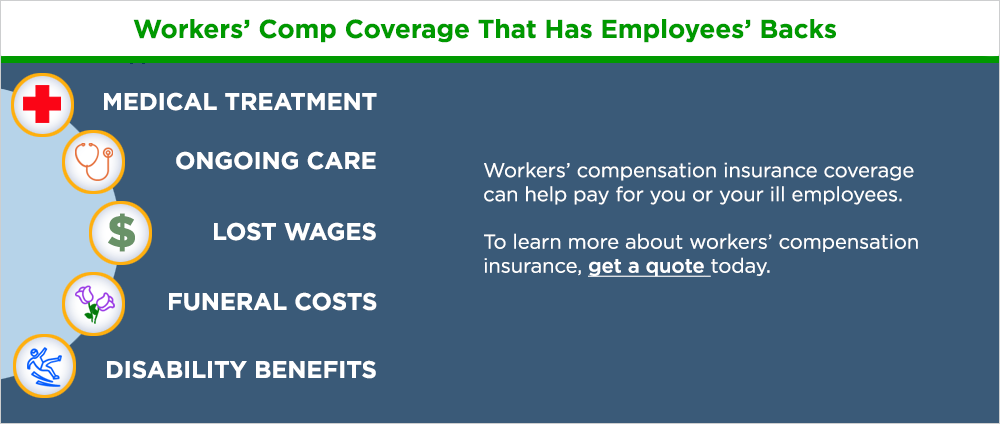Worker compensation insurance stands as a vital safety net, ensuring financial security for employees injured or ill on the job while safeguarding businesses from crippling legal liabilities. This insurance program, mandated by law in most states, has evolved significantly since its inception, adapting to changing workplace environments and emerging hazards.
The system encompasses a complex interplay of regulations, claims processes, and benefit structures, aiming to strike a balance between worker rights and employer responsibilities. Understanding the intricacies of worker compensation insurance is crucial for both employees and employers, as it impacts workplace safety, employee morale, and ultimately, business success.
Who Needs Worker’s Compensation Insurance?

Worker’s compensation insurance is a type of insurance that helps protect employers from financial losses that can occur when employees are injured or become ill on the job. It’s a vital component of a comprehensive safety program for businesses. This type of insurance is generally mandatory in most states, but there are some exceptions.
Types of Employers Required to Have Worker’s Compensation Insurance
In most states, employers with one or more employees are required to have worker’s compensation insurance. This includes businesses of all sizes, from small startups to large corporations.
- Businesses with employees: The most common requirement for worker’s compensation insurance is having employees. The specific number of employees may vary by state, but generally, if you have one or more employees, you are required to have worker’s compensation insurance.
- Independent contractors: While independent contractors are not technically employees, some states require employers to provide worker’s compensation insurance for them. It is important to understand the rules and regulations for your specific state.
- Domestic workers: Some states require employers to provide worker’s compensation insurance for domestic workers, such as nannies, housekeepers, and personal care providers.
Exceptions to Mandatory Coverage
While worker’s compensation insurance is generally mandatory for most employers, there are some exceptions.
- Sole proprietorships: In some states, sole proprietors who are the only employees of their business are not required to have worker’s compensation insurance. However, it is still advisable for them to obtain coverage to protect themselves from potential financial losses.
- Partnerships: Similar to sole proprietorships, partnerships may not be required to have worker’s compensation insurance in some states. However, it is important to note that each partner is considered an employee, and they may be required to obtain coverage for themselves.
- Small businesses: Some states have exemptions for small businesses with a limited number of employees. However, these exemptions may have specific requirements, such as a certain number of employees or a specific type of industry.
Consequences of Not Having Worker’s Compensation Insurance, Worker compensation insurance
The consequences of not having worker’s compensation insurance can be severe.
- Fines and penalties: Employers who fail to provide worker’s compensation insurance can face significant fines and penalties. These penalties can vary by state and may include fines, imprisonment, or both.
- Liability for medical expenses: If an employee is injured on the job and the employer does not have worker’s compensation insurance, the employer may be held personally liable for the employee’s medical expenses. This can be a substantial financial burden.
- Lost wages: Employees who are injured on the job may be entitled to lost wages if the employer does not have worker’s compensation insurance. This can be a significant financial hardship for both the employee and the employer.
- Reputational damage: Not having worker’s compensation insurance can damage the employer’s reputation. Customers and potential employees may be hesitant to do business with an employer who does not prioritize the safety and well-being of their employees.
Costs and Premiums of Worker’s Compensation Insurance

Worker’s compensation insurance is a necessity for most businesses, but the cost can vary significantly. Understanding the factors that influence premiums and exploring strategies for managing costs is crucial for businesses to ensure financial stability.
Factors Determining Worker’s Compensation Insurance Costs
The cost of worker’s compensation insurance is determined by several factors, including the industry, the size of the workforce, the history of claims, and the state where the business operates.
- Industry: Certain industries are inherently riskier than others. For example, construction workers are more likely to experience injuries than office workers. Therefore, businesses in high-risk industries will typically pay higher premiums.
- Size of the Workforce: Larger businesses with more employees generally face higher premiums. This is because the likelihood of claims increases with the number of employees.
- History of Claims: Businesses with a history of frequent or costly claims will typically pay higher premiums. This is because insurers view these businesses as higher risk.
- State Regulations: Each state has its own worker’s compensation laws and regulations. These regulations can significantly impact the cost of insurance, as they determine the benefits that employees are entitled to.
Methods of Calculating Premiums
Insurance companies use various methods to calculate worker’s compensation premiums. Two common methods are:
- Experience Rating: This method takes into account the employer’s past claims experience. Businesses with a good claims history may receive a lower premium, while those with a poor history may pay a higher premium.
- Manual Rating: This method uses industry averages and other factors to determine the premium. This method is typically used for businesses with no prior claims history.
Strategies for Managing Worker’s Compensation Insurance Costs
Businesses can implement various strategies to manage their worker’s compensation insurance costs:
- Implement a Robust Safety Program: By investing in a comprehensive safety program, businesses can reduce the likelihood of workplace injuries, leading to fewer claims and lower premiums.
- Provide Employee Training: Investing in employee training programs that emphasize safety practices can help prevent accidents and reduce the risk of claims.
- Manage Claims Effectively: Businesses should have a clear process for handling claims promptly and efficiently. This can help minimize the cost of claims and avoid unnecessary disputes.
- Shop Around for Insurance: It’s essential to compare quotes from multiple insurance providers to find the most competitive rates. Businesses should also consider the insurer’s financial stability and reputation.
- Consider Self-Insurance: For large businesses with a good safety record, self-insurance might be a viable option. However, this requires careful planning and financial resources to manage claims effectively.
Benefits of Worker’s Compensation Insurance
Worker’s compensation insurance offers a range of benefits to both employers and employees, contributing to a safer and more secure work environment. It provides a safety net for employees facing work-related injuries or illnesses, while also safeguarding employers from potential legal and financial burdens.
Benefits for Employers
Employers who carry worker’s compensation insurance benefit from reduced legal liability, improved employee morale, and a safer work environment.
- Reduced Legal Liability: Worker’s compensation insurance provides employers with protection against lawsuits filed by injured employees. This significantly reduces the risk of costly legal battles and associated expenses. By providing a pre-determined system for handling workplace injuries, it eliminates the need for lengthy court proceedings and allows for a more straightforward resolution.
- Improved Employee Morale: Knowing they have access to medical care and wage replacement in case of an injury or illness, employees feel more secure and valued. This translates to higher morale, increased productivity, and reduced absenteeism. Employers can focus on creating a positive and supportive work environment, fostering a sense of trust and loyalty among employees.
- Safer Work Environment: Worker’s compensation insurance encourages employers to prioritize workplace safety. By implementing safety programs and procedures, employers can reduce the risk of accidents and injuries, minimizing the need to file claims and lowering insurance premiums. This creates a safer work environment for all employees, leading to fewer accidents and improved overall well-being.
Benefits for Employees
Employees who are covered by worker’s compensation insurance benefit from access to medical care, wage replacement, and protection from financial hardship.
- Access to Medical Care: Injured or ill employees are entitled to receive medical care, including treatment, rehabilitation, and medication, at no cost to them. This ensures that employees receive the necessary medical attention to recover from their injuries or illnesses without facing financial strain.
- Wage Replacement: Employees who are unable to work due to a work-related injury or illness receive a portion of their wages as compensation. This helps them maintain financial stability and avoid falling into debt during their recovery period. The amount of wage replacement varies depending on the state and the employee’s earnings, but it provides essential financial support during a challenging time.
- Protection from Financial Hardship: Worker’s compensation insurance protects employees from financial hardship in the event of a work-related injury or illness. It ensures they have access to medical care and income replacement, preventing them from facing significant financial burdens. This allows employees to focus on their recovery without worrying about mounting medical bills or lost wages.
Examples of Worker’s Compensation Insurance Policies
Worker’s compensation insurance policies are available in various forms, each tailored to meet the specific needs of different businesses. Understanding the different types of policies can help you choose the one that best suits your company’s size, industry, and risk profile.
Types of Worker’s Compensation Insurance Policies
There are several types of worker’s compensation insurance policies available, each offering different coverage and features. Here’s a comparison of some common types:
| Policy Type | Features | Benefits | Costs |
|---|---|---|---|
| Standard Policy | Covers all employees and provides basic benefits for work-related injuries and illnesses. | Provides medical care, lost wages, and disability benefits. | Generally the most affordable option, with premiums based on industry, payroll, and claims history. |
| Customized Policy | Allows for tailored coverage based on specific business needs, including high-risk industries or specialized employee roles. | Offers greater flexibility and customized benefits to meet specific business requirements. | Premiums may be higher due to customized coverage and potentially higher risk factors. |
| Group Policy | Designed for multiple businesses in the same industry or with similar risk profiles. | Offers potential cost savings through shared risk and bulk purchasing power. | Premiums may vary depending on the group’s size, industry, and overall claims history. |
| Self-Insurance | Businesses assume the financial responsibility for worker’s compensation claims. | Greater control over claims management and potential cost savings if claims are low. | Requires significant financial resources to cover potential high-cost claims and may involve administrative complexities. |
Sample Worker’s Compensation Insurance Policy
A sample worker’s compensation insurance policy document may include the following key provisions:
Coverage: This section Artikels the specific types of work-related injuries and illnesses covered by the policy.
Benefits: This section details the benefits available to employees, such as medical care, lost wages, and disability benefits.
Exclusions: This section lists specific situations or conditions that are not covered by the policy, such as pre-existing conditions or injuries unrelated to work.
Premium: This section specifies the premium amount and payment schedule.
Claims Procedures: This section Artikels the steps for reporting and processing claims.
Cancellation: This section details the conditions under which the policy may be cancelled.
Impact of Worker’s Compensation Insurance on Business Operations: Worker Compensation Insurance
Worker’s compensation insurance plays a crucial role in shaping the operational landscape of businesses. It directly impacts costs, compliance, safety practices, and employee productivity, influencing overall business success.
Costs and Compliance Requirements
Worker’s compensation insurance premiums are a significant cost factor for businesses. The premiums are calculated based on various factors, including the industry, the number of employees, and the company’s safety record. Businesses must comply with specific regulations and reporting requirements related to worker’s compensation insurance. These requirements can involve maintaining accurate records, reporting injuries and illnesses promptly, and participating in safety training programs. Non-compliance can lead to penalties and fines.
Impact on Workplace Safety
Worker’s compensation insurance encourages businesses to prioritize workplace safety. By providing coverage for work-related injuries and illnesses, the insurance incentivizes employers to implement safety measures and create a safer work environment. This proactive approach can help reduce the frequency and severity of workplace accidents, ultimately leading to lower insurance premiums and improved employee well-being.
Employee Productivity and Absenteeism
Worker’s compensation insurance influences employee productivity and absenteeism. When employees feel confident that they will be protected in case of work-related injuries or illnesses, they are more likely to focus on their tasks and contribute to the company’s success. Conversely, a lack of worker’s compensation insurance can create anxiety and uncertainty among employees, potentially leading to reduced productivity and increased absenteeism.
Conclusive Thoughts
Worker compensation insurance, a cornerstone of workplace safety and financial security, continues to adapt to the evolving landscape of work. As new technologies emerge and industries transform, the system must remain agile and responsive to ensure fairness and protection for both employees and employers. By fostering a culture of workplace safety and promoting transparent claims processes, worker compensation insurance can play a vital role in creating a safer and more equitable work environment for all.
Worker’s compensation insurance protects employees in case of workplace injuries or illnesses. While this covers work-related incidents, it doesn’t extend to your personal life. For that, you’ll need a separate policy like home and auto insurance to safeguard your property and vehicles.
Just as worker’s compensation ensures your well-being at work, a comprehensive home and auto policy provides peace of mind for your personal life.
